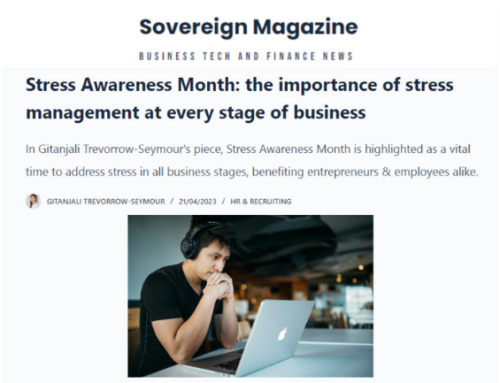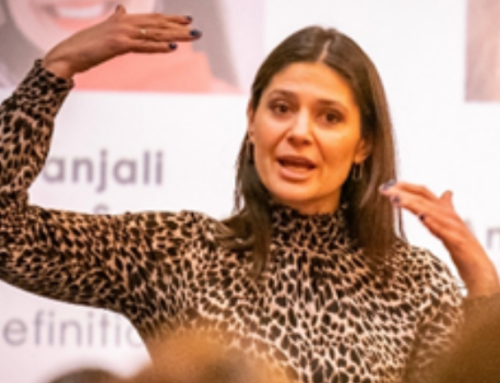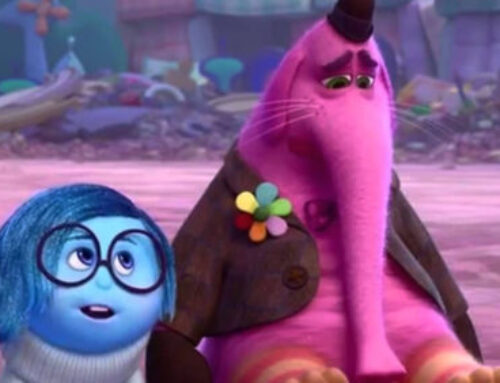High Definition You Podcast: In Conversation with Christina Lucas (A Collaboration with AIG)
Christina is the Senior Vice President, Global Claims Business Performance at AIG. As a senior executive, insurance industry visionary and award-winning leader. In this High Definition You Podcast Christina shares her leadership approach with Gitanjali.
Her focus and business specialties are: building and developing global and domestic organizations, transforming divisions from average to high-performing engines, instituting revenue growth strategies to drive increased revenues and shareholder value – with an empathetic, flexible, engaging and customer-centric manner as a courageous agent for change, delivering groundbreaking results.
So, how does she do it? Listen to Christina’s conversation with Gitanjali on her leadership approach makes a difference.
00:13
Welcome, everybody. It’s Gitanjali here from High Definition You and today I am joined by the magnificent Christina Lucas. Christina is joining us actually live from Miami, she has had quite an incredible career, she started in management consulting, and really, that desire to own the outcome of your own work moved you towards the insurance industry.
And you’ve spent eight years now at AIG, and had an opportunity to move around in different locations, including Tokyo, and Sofia in Bulgaria, and working in a couple of different divisions as well around claims operations and Global Business Services. She’s now the Senior VP in Global Claims Business Performance.
And it’s very apt because performance is something this woman knows a lot about. She is really known for transforming divisions that let’s call it are quite average, and making them into high-performing engines. And she does it by increasing that engagement, decreasing attrition. And what I love is that you do it with a real understanding of the elements of leadership that are not necessarily ones that we have traditionally spoken about.
So you talk a lot about empathy, and how that is really necessary in a crisis, about optimism about having a positive attitude, transparency, openness. And you’re really known in the industry as that courageous agent for change. And that excites me to talk to you more about that today. Because courage is definitely something that I love to talk about. And I am very, very grateful that you are going to choose English as one of the six languages that you speak.
This interview is podcasting with me, so thank you for choosing that. Let me start there, actually, Christina? six languages. Where did that come from?
02:10
Thanks Gita, it’s hard to follow that introduction, thank you for such kind and beautiful words, I’m really humbled by it. So, I am from Golo, Kentucky, which isn’t a place that’s known for polyglots, but always wanted to go abroad. And I always wanted to see the world.
And I’m a very people person andnd I thought, well, the best way for me to do that is to meet other people have play and learn that language. So as a child, we lived in Germany.
So that’s really the first second language that I learned while living in Germany for a couple of years, moved back to the US, I was one of those people, those geeks who studied Latin forever. So I had five years of Latin, high school andnd then it was really just picking up the languages.
So going through the Romance languages, you know, with French and Italian. Later on in life, I learned Spanish and Portuguese and actually lived in Brazil for a bit as well. So it was just really taking that foundation and for me, it’s just been a great bridge to connect with people. Whether it’s at work or my personal life.
03:11
Amazing. My goodness, Brazil, Latin, French, Italian, what are you not good at?
03:20
Many things. I mean, it’s always, you know, even now, in my career, there’s always something new to learn. One of my keys to success, it’s just constantly reading, like, I love reading from a child and I’m reading you know, now it’s thought leadership, it’s the news, as you know, Harvard Business Review, and to learn about management styles, but then also just really understanding different industries.
So, even though I’ve been insurance for nearly eight years, when I joined AIG, there’s so much to learn around the logistics industry, what they’re doing with Amazon or Uber, you know, to have the consumer retail business with some of the innovative marketing that we see with Nike and other brands. So, it’s really taking all of this information that’s available to us so readily, and seeing how we can apply it to our day-to-day.
04:10
And as you’re talking about the different elements of insurance, you know, it’s an industry that has changed, as you say, and I wonder what your parents actually say that it is that you do for a living, how do you describe what you do for a living?
04:26
It’s a good question because it always comes up over Christmas dinner, and we’ll try to figure out what I do, where’s Christina these days? Because as you mentioned, I’ve lived all over the place and what am I doing?
What I think, you know, if I asked my Mom what I did, she’d say that I’m really able to drive change, and really help to motivate and coach people to solve really sticky difficult business challenges and that’s probably how you break it down so simply that my Mom would understand it, my Grandma would understand.
04:59
Do you think they saw that in you when you were little Christina that you were that problem solver? That you were the connector?
05:06
I was, I was always like, super curious. You know, just loving kind of, you know, science, of course are I played a couple of different instruments too when I was younger, in school, so I was always kind of curious to expand out a little bit more from where I was. And of course, you know, kind of that community, being part of a community, moving across the world are really feeling grounded in my community and connecting and other people’s always been key to, to me.
So I think it’s just the adult version of who I was when I was a little kid. And I’m able to really enjoy it, and really create kind of career with it was something that was really a lot of different interests in my agenda..
05:46
Yeah. And when you think about that younger version of you, Christina, when, when you were 15? Would 15-year-old you be proud of who you are today?
05:57
I think so, I would say so. And actually, I used to write myself letters, you know, like my 15-year-old self, to my 30-year-old self, actually need to go to my mother and see if I can find those because it just made me think about that. What do you think so because really, as a child, I knew I wanted to have a global career, I didn’t really know what that looked like, given my background and where I was from.
But you know, seeing people on TV, I knew I wanted to be out there doing something and I wanted to really be able to make a positive impact, I wanted to be able to stay true to my values, really to my core of being a people person, being empathetic, being kind of a trusted listener and business partner to others. And that’s who I was in high school. And you know, it’s who I am today.
06:45
I think we want to see a little insight into some of those letters, Christina, I think that would be amazing. What did 15 year old you say to a 30-year-old you? I love it. I know certainly part of that journey you’ve already talked a little bit about your values, it’s always interesting to see where they’ve come from and how they’ve evolved. Who would you say are the people that have really shaped the way that you see success?
07:13
So it’s interesting, I remember when I, before I moved before I moved to AIG, I worked for Deloitte. And we had the CEO of our division, I was in our financial advisory services practice, was just a great leader. And I think what really attracted to me to his leadership style was that he was just so open and transparent and inclusive.
So, our financial advisory group had about 2000 employees around the world, mostly in the US. But he really made an effort to go to each of our offices at least once a year to meet with people, and he actually remembered your name. And he’d say, Christina, you know, how are you doing?
What clients are you on? What would you like to do? And if I saw him six months from now, he would ask me about that client that I had mentioned to him and if I was able to reach my goal, so you know, when I moved to work with other people later on, who didn’t remember names or didn’t remember your project, and I remembered how it made me feel when, you know, he actually acknowledged what I had done and heard me.
And if I wrote him an email, you’d respond back to the next day, or a couple days later, that inclusiveness for somebody that was so senior kind of really set the standard of that leader that I like to be
08:29
That is amazing. And I’m hearing some interesting things there around remembering names, and what are the key behaviors, right around success, and then coming back to you in a certain amount of time as well, when you were corresponding, and really outside of any hierarchy.
So, you weren’t made to feel like because you were quite Junior, there was some sort of hierarchy that you needed to go to that maybe you didn’t get a response on your email till, you know, a week later, for example.
What are some of those elements do you think, you know, what’s the mindset that goes along with that in terms of really creating that level of success and in your own experience as well, not just with him in mind?
09:14
You know, I would say it’s creating that connection with people kind of acknowledging people’s differences, and also what they can contribute. So for me, I think one of my core skills is listening, right? So it’s being able to tap into the knowledge, the experience, the observations that other people have, and how to really challenge or really channel that knowledge and experience and observations into something productive, that’ll bring value to the organization.
So for me, one of the key skills was really listening and acknowledging the people’s inputs right. At the end of the day, we’ll have to make a decision collectively around what needs to be done to drive the transformation changes needed, but at the heart of that stakeholder engagement is really listening to those different voices along the way to do so.
And, you know, related to listening, I think listening also helps to build trust. And I see as a leader, building trust with your team, and with your stakeholders is really core to success. And building that trust comes from really making sure that everyone’s acknowledged their voice, whether or not that you go along with that plan or not.
But it’s really acknowledging those different inputs, engaging with those different stakeholders, and using all of those different views, to find and make your final decision.
10:34
Fantastic. And you make it sound so effortless now, and you recognize that listening is one of your key skills, when you’re just starting out, that’s not always apparent to you in terms of what your skills are, or certainly from a leadership perspective, what those elements of success are.
So come with me in the time machine, Christina and let’s go back to the beginning of your career. And tell me a little bit about what you would tell yourself to stop doing maybe, start doing more of and then what did you even recognize back then that you were doing well, but you would say, hey, Christina, continue doing this.
11:16
So, you know, start with the things just start doing more earlier on was, it’s really that finance and business acumen was always kind of an area where I thought, well, you know, later on in the career, when I have a budget to manage when I’m making those big decisions around the financials, I should dig into it more.
But I recognize it should have been so this earlier on to really understand how money flows through the organization, and how my contributions to that organization really drive the bottom line. I think, understanding your own value proposition, and what you can contribute, you know, whether you’re on the profit centre side, or on the operation side, like all those elements are important, but I think being able to articulate that out is key.
So that’d be something that I would have started earlier is to really understand finance and accounting and how those synergies come together with the work that I was doing to drive the bottom line of the organization. You know, one thing that I would probably stop doing is, I think I felt especially early on in my career that I needed to do things alone, and that I needed to be kind of that superhero that could do all things for everybody, you know, all the time.
So it’s really understanding like what my personal strengths are, and being able to leverage my personal strengths to drive, whatever the project was I was working on, but also being able to communicate out to my manager, even to my peers, where I needed help, and where they might have had skill sets that were complementary, to really help us to get a better result.
So it’s that that ability to collaborate and communicate more effectively so that more people can get a project done much more effectively, that kind of one person wearing all hats. And then, you know, continue, I would say, is really the networking part of it. I think, you know, there’s kind of my set of friends from college that went into my first jobs, right, where you really have that connection that everybody kind of spreads out a bit and you start going in different career paths, you start going to different places, starting new families.
Now, I’m really, over the past few months, I’ve started to reconnect with people, you know, from 10 years ago, or plus, which has been really great and rewarding. So I think we need to be more consistent around making sure that those relationships from high school, college, you know, my first job, that they become those friendships and relationships for life. So you can always kind of catch up later. And it’s great to be able to reconnect with people, but I would like to be more consistent with that.
14:03
Wonderful and I know that myself in my career, I remember when I was working at one of my, my, the banks that I was in and I remember looking at some of those MDs and thinking, wow, they’re so well connected. And then as I got to know them a little bit better, I realized that these were people that they had known for a very, very long time, and they’ve kind of grown up together.
So doing that in a deliberate way actually just consciously from the beginning and being consistent about it is really valuable in the long term. And just maintaining those relationships right because you don’t know where people are gonna end up or how you’re going to be able to help them as well, not in at all, they might be able to help me one day but yeah knows where you can Yeah, I wonder Yeah, with that in mind, where, how you keep learning now at your level, how do you keep getting better given that you’ve had so much to experience now.
So it’s almost like to do when you’re in school and setting aside time to really read and study. You know, we kind of get caught in our day-to-day and it would be meetings back to back and you realize that you’re not really getting any fresh new ideas into your repertoire. So I’m signed up to tons of different newsletters, and I also get tons of different kinds of insurance or management publications that I get on my iPad.
So, I can read those as well. And then just reading the information, as I said, outside of your industry is also very key. So I found that when I do schedule time to study that I’m able to get more done. And every time I read something, I just find, kind of a new connecting point, you know, with a way that I thought about something that I can think of differently, or way that I can structure something that I could structure differently, and based on maybe some best practices, or a case study that I read somewhere else.
So it’s really, you have to schedule, I think with everything, it has to be intentional with your networking, with yourself development. There are tons of resources out there, which can almost be overwhelming. But it’s really scheduling that time. You know, coming up with what your objectives are, just slowly working towards it right because it comes over time. It doesn’t happen.
16:22
Yeah, that pace, not race situation. I’m interested to hear more about the publications outside of what your insurance industry has to offer. But I’m going to do some quickfire questions and maybe one of them will come out.
And if not, then you know, people can always connect with you and ask them questions, I’m sure as well. So, let’s go to our quick fire round and get a little more insight into Christina Lucas, here she goes warmed up. Are you ready? Okay, Christina, what is your favourite word?
16:56
Serendipity.
16:57
What is your go-to takeout order?
17:03
I love Indian food, the Bhindhi Marsala. A funny story. And I was living in Japan, you kind of wanted comfort food and you want comfort food in English because even though I lived in Japan, my Japanese is not one of the languages that I would count on.
And so I could always go to the Indian restaurant and know that they spoke English and that I knew what the flavour was going to be there’d be nothing unusual or exotic in the disg. And it was also my chance to get some good vegetables, you know, so.
So Indian, especially the Vinloo Marsala, being a Southerner too, with the okra. has been made right?
17:38
And you can rely on it. I love that. Because I’m half Indian. But yes, a book or TED talk that you love.
17:47
There’s a TED talk last year by Cara Khan. It was part of the TED women’s series. And I think it was called the beautiful balance between courage and fear. And it’s really how do you push yourself in a situation that, frankly, is scary.
And I think we deal with that she has a very extreme circumstance that she talks through in that TED Talk. But I think it’s a great lesson learned for all of us.
18:10
Beautiful. And if you had one superpower, just one what would it be?
18:17
To teleport your time. I’m gonna go backwards to save some time or skip over things I don’t want to do.
18:25
What sound or noise do you love?
18:28
A cello? And so as a child, I have played the cello through school and I just think it balances the human voice you know, in a more melodious way than I could ever sing. So I just love hearing cello. I love the symphony.
18:44
Beautiful and what profession, other than your own would you like to attempt?
18:49
So this will give you insight into the magazines, I would love to be a chef. So I have a couple of business magazines on my iPad but I think they have like two dozen food magazines I’m looking through all the time and it’s probably more than most of my newsletters. So that’s my guilty pleasure.
19:07
One little sneaky extra question then outside of the quick-fire round is what’s your go-to dish then that you love to cook?
19:14
I’m actually quite creative. So years ago when I was living in DC actually won the best bolognese by the Italian cultural society. I beat all of the Italian grandmother recipes so super excited about that.
But lately, I’ve been in Reno really exploring some different cuisines or cooking more healthier things or lighter foods because it’s been the summertime.
Sri Lankan cuisine has also been one that I’ve been experimenting with more during the past few months. And now that I’m here in Miami for the rest of the summer, kind of look for some more tropical, you know, fruits and vegetables that I can cook in a different way. Maybe a little bit of ice cream.
19:57
Oh yeah. Right there with you with the ice cream. So the final question is Christina if you could have a billboard with anything on it, what would it be?
20:10
I’m going to steal a trademark, I’m going to say just do it. Because for me, it’s been, I’ve been faced with a lot of different opportunities. I frankly, have been scary, you know, to go into, you know, leaving home and going to Brazil or going to Tokyo and not knowing Japanese or the culture, or leaving of the team in Bulgaria.
But when I was a kid, my mom used to always say, Well, if you have the opportunity to do it, if you don’t like it, you know, if it doesn’t work out, you always come home, and I’ve never come home.
Except just to visit. So I think it’s just if you’re afraid of it, you know, talk it out, I really, I’m really open about sharing when I do have fears, you know, with, you know, senior mentors and sponsors, with my friends, with my family and, and kind of just getting those inputs from them on how to address those.
But every time that I’ve gone into a situation kind of scared and wondering if I should do it, I’ve always come out successful on the other side. So I would just say, you know, if you have a great kind of once-in-a-lifetime opportunity, don’t regret not doing it.
21:15
Amazing, will not tell Nike about that billboard. Well, it’s been an absolute pleasure spending some time with you, Christina, thank you for sharing all of your insights and a little bit more about Christina at 15. And the Christina in the future, which I’m now visualizing has a chef’s hat as well.
Thank you so much. I really appreciate it. And if people want to reach out to you, can they connect with you on LinkedIn? Is that the best way? help them stay connected? Absolutely.
21:44
LinkedIn, and you know, AIG, if you’re internal as well, you can connect with me via email, and I’d love to really meet our intern class coming up. So thank you.
21:55
Brilliant. Thank you, Christina. Thanks.





